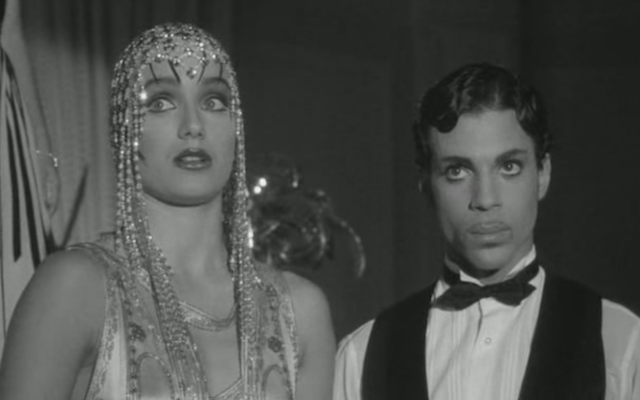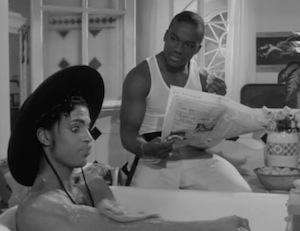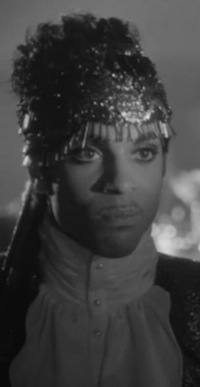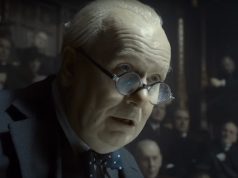
Prince’s 1984 film “Purple Rain” was successful with audiences and critics because they accepted it for what it was: a 110-minute music video featuring music they liked. It didn’t matter that the story and acting were mediocre, because those factors are irrelevant in music videos. But then Prince pressed his luck with a follow-up film, called “Under the Cherry Moon,” in which he minimized the musical component and focused on plot and characters. Prince was acting on the old showbiz principle that says, “Find out what they want, then give ’em the exact opposite in direct proportion to how much they don’t want it!
“Under the Cherry Moon” is insufferable in a variety of ways. For one thing, it’s in black-and-white, which is usually a pretentious choice after 1970 and in this case was probably to match Prince’s favorite films, which were perfume commercials. Also, Prince directed it himself, even though he did not know how to do this. He was already on thin ice with the whole “acting” business. You should be wary of a movie whose lead actor and director are a person who is actually neither of those things.
We start on two good notes, however. The credits reveal that Kristin Scott Thomas is in this movie — her first film role, as indicated by the words “introducing Kristin Scott Thomas.” (“Everyone, I’d like you to meet Kristin Scott Thomas,” the movie says. “Kristin, this is everyone.”) We also get this bit of good news from the narrator, concerning Prince’s character: “He lived for all women — but he died for one.” That means he’s going to die before the movie’s over! Little things like that are what keep us going.

Prince plays Christopher Tracy, a nightclub pianist and part-time gigolo who works the wealthy female population of the French Riviera. His partner in hustling is Tricky (Jerome Benton), a waiter at the lounge, and the two share a cheap apartment where they sit around with their shirts off and engage in unfunny faux-homoerotic banter, like when Tricky reminds Christopher of some task that needs to be done and Christopher says, “You know I think you’re cute, but you’re not my wife!” In another scene, Christopher is taking a bath (no bubbles) while Tricky sits reading in a chair next to the tub. All of this makes as much sense as anything else in the movie — whose central premise, after all, is that a scrawny, glittering midget with a John Waters mustache is a successful gigolo.
Christopher and Tricky have set their sights set on Mary Sharon (the aforementioned KST), a socialite and heiress to a $50 million fortune, and they crash her elegant 21st birthday party in order to cozy up to her. At first, Mary seems like the type of unpretentious rich girl who might actually go for a two-bit hustler: our introduction to her comes when she appears at the party clad in a towel, flashes everyone, then sits down and plays the drums. Queen Elizabeth she ain’t. But Christopher, suffering from the same inflated sense of self-regard as the non-actor who non-plays him, goes too far in his flirtations with her. He gets kicked out of the party (which, you’ll recall, he was not invited to in the first place) after he materializes in Mary’s bedroom and pesters her while she’s on the phone with her overseas boyfriend. Indignant at being ejected merely for party-crashing and breaking-and-entering, Christopher declares that Mary needs to “loosen up.” How much looser a person who flashes her guests and plays the drums in a towel can possibly get, I dare not imagine.

Actually, from this point forward the movie pretends the flashing incident didn’t happen. Now that Christopher has decided Mary is a stuck-up prude, that’s what she is. Well, except for the times when she suddenly cuts loose and parties with Christopher, I mean. These moments appear at random intervals and without any warning. One minute Mary is rejecting Christopher’s advances and considering him beneath contempt; the next minute — literally, less than 60 seconds later — she’s dancing like a maniac at the nightclub where Christopher has commandeered the microphone to sing a Prince song. Likewise, sometimes Christopher is a suave, elegant man capable of seducing society women, and other times he’s a crass idiot who speaks in street slang. This inconsistency is easy to explain, though: the people who made the movie didn’t care.
There is a scene where Christopher talks to Mary on the phone and persuades her to let him come over and do sex with her, but then Christopher sneaks in through the wrong window at Mary’s house and almost does sex with Mary’s mom instead. But we’re not going to talk about this scene, because it is troubling.
Instead, we will talk about Mary’s father, Isaac (Steven Berkoff). Unlike Mary, who disapproves of Christopher only 50 percent of the time, Isaac disapproves of him 100 percent of the time. He wants his daughter to marry some fancy rich dude, not a golddigger who doesn’t love her. Dads are weird like that! Lucky for Isaac, Christopher and Tricky ran afoul of some bad guys back in Miami, so all he has to do is apprise said bad guys of Christopher’s current whereabouts and let them do the rest. (Tricky, you may have noticed, is irrelevant most of the time. This is generally the case with people who go by names like “Tricky.”) I assume the way Isaac knows about Christopher’s troubled past is that there is some kind of Evil Rich Guy database that keeps track of outstanding grudges, vendettas, and the like. You type in the person’s name and some identifying characteristics (Christopher; 5’3″; mustache drawn with mascara; spangly outfits; somehow both painfully shy and irritatingly flamboyant), and see if you get any matches.
The upshot is that the bad guys track Christopher down and shoot him, and he dies. But first he professes his true love for Mary, which may or may not be sincere. THEN he dies. The important thing is that he dies. So what was the point of it all? Well, it’s a classic Hollywood story: boy meets girl; boy intends to swindle girl; girl vacillates between encouraging and rejecting boy; boy almost has sex with girl’s mom, for comedy; boy takes bath under best friend’s supervision; girl’s father orders murder of boy; girl loses boy; boy agrees never to make another film. And we all lived happily ever after!
— Film.com





